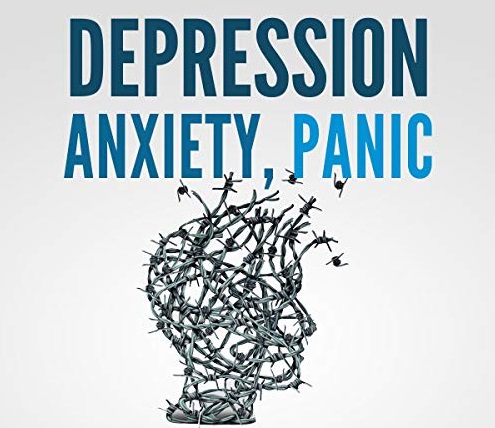
The Unseen Struggles of Anxiety: Understanding Intrusive Thoughts and How to Overcome Them

Anxiety is a common mental health condition that affects millions of people worldwide. While many are familiar with its more apparent symptoms—such as restlessness, rapid heartbeat, and excessive worrying—there are deeper, less visible struggles that often go unnoticed. One of the most challenging aspects of anxiety is dealing with intrusive thoughts. These unwelcome, involuntary thoughts can be distressing and overwhelming. Understanding what intrusive thoughts are and learning effective strategies to manage them can provide significant relief for even the most anxious individuals.
What Are Intrusive Thoughts?
Intrusive thoughts are unwanted, involuntary thoughts, images, or urges that can be disturbing and difficult to manage. They often appear suddenly and can be about anything, including fears, worries, or past traumatic experiences. For someone with anxiety, these thoughts can be particularly distressing because they may fixate on them, leading to increased anxiety and emotional turmoil.
Intrusive thoughts can manifest in various forms:
- Obsessive Thoughts: Recurrent, persistent thoughts that are difficult to ignore or suppress.
- Negative Imagery: Disturbing mental images that can provoke fear or distress.
- Impulsive Urges: Sudden, intense urges to do something harmful or inappropriate, despite having no intention of acting on them.
Why Do Intrusive Thoughts Occur?
These thoughts are a natural part of the human experience and occur in everyone to some extent. However, for individuals with anxiety, these thoughts can become more frequent and intense. Several factors contribute to the occurrence of intrusive thoughts:
- Stress: High levels of stress can trigger or exacerbate intrusive thoughts.
- Trauma: Past traumatic experiences can lead to recurrent intrusive thoughts related to the trauma.
- Mental Health Disorders: Conditions such as Obsessive-Compulsive Disorder (OCD), Post-Traumatic Stress Disorder (PTSD), and Generalized Anxiety Disorder (GAD) are often associated with intrusive thoughts.
- Biological Factors: Imbalances in brain chemistry and genetic predispositions can play a role.
Effective Strategies to overcome these challenging thoughts
While intrusive thoughts can be challenging to manage, several strategies can help individuals cope with and reduce their impact. Here are some effective methods:
- Cognitive Behavioral Therapy (CBT)
- Description: CBT is a type of psychotherapy that helps individuals identify and change negative thought patterns and behaviors. It is highly effective for treating anxiety and intrusive thoughts.
- How it Helps: Through CBT, individuals learn to challenge and reframe their intrusive thoughts, reducing their power and frequency.
- Mindfulness and Meditation
- Description: Mindfulness involves staying present and fully engaging with the current moment without judgment. Meditation practices can help cultivate mindfulness.
- How it Helps: By practicing mindfulness, individuals can observe their intrusive thoughts without reacting to them, which can decrease their intensity and frequency.
- Exposure and Response Prevention (ERP)
- Description: ERP is a type of therapy commonly used for OCD, where individuals are gradually exposed to their fears and taught to refrain from engaging in compulsive behaviors.
- How it Helps: This method helps reduce the anxiety associated with intrusive thoughts by desensitizing individuals to their triggers.
- Medication
- Description: Certain medications, such as selective serotonin reuptake inhibitors (SSRIs) and benzodiazepines, can help manage anxiety symptoms.
- How it Helps: Medications can help regulate brain chemistry, reducing the frequency and intensity of intrusive thoughts.
- Healthy Lifestyle Choices
- Description: Maintaining a healthy lifestyle through regular exercise, a balanced diet, adequate sleep, and stress management techniques.
- How it Helps: A healthy body can contribute to a healthier mind, reducing overall anxiety and its symptoms.
- Journaling
- Description: Writing down thoughts and feelings in a journal.
- How it Helps: Journaling can provide an outlet for expressing and processing intrusive thoughts, making them feel less overwhelming.
- Support Groups and Therapy
- Description: Joining support groups or seeking therapy can provide a sense of community and professional guidance.
- How it Helps: Sharing experiences and receiving support from others can alleviate feelings of isolation and provide practical coping strategies.
Intrusive thoughts are a challenging aspect of anxiety, but understanding their nature and implementing effective strategies can make a significant difference. By employing techniques such as CBT, mindfulness, ERP, medication, healthy lifestyle choices, journaling, and seeking support, even the most anxious individuals can learn to manage and overcome their intrusive thoughts. With persistence and the right approach, it is possible to reduce the impact of these thoughts and lead a more peaceful, fulfilling life.


The hidden signs of unprocessed trauma: What to look for, how to understand them and stay away from denial at all cost. The many difficult challenges ahead!

Unprocessed trauma can cast a long shadow over one’s life, often manifesting in ways that are not immediately obvious. Recognizing these hidden signs, understanding their implications, and confronting them without falling into denial is crucial for healing and moving forward. This article explores the subtle indicators of unprocessed trauma, provides insights into comprehending these signs, and emphasizes the importance of avoiding denial despite the difficult challenges that lie ahead.
Question is: How to recognize these hidden signs?
Trauma can stem from various experiences, including abuse, accidents, natural disasters, or significant loss. While some trauma symptoms are immediate and apparent, others are more insidious and can remain unnoticed for years. Here are some examples:
Emotional Numbness:
What to Look For: An inability to feel emotions fully, experiencing a persistent sense of detachment or emptiness.
Understanding It: Emotional numbness serves as a protective mechanism, shielding the individual from the intense pain associated with trauma.
Hypervigilance:
What to Look For: Constantly feeling on edge, easily startled, or excessively aware of surroundings.
Understanding It: This heightened state of alertness is the body’s way of staying prepared for potential threats, a residue from the traumatic experience.
Avoidance Behaviors:
What to Look For: Avoiding people, places, or activities that remind one of the trauma; engaging in excessive work or hobbies to distract oneself.
Understanding It: Avoidance is a common coping strategy to prevent re-experiencing the trauma or associated distress.
Physical Symptoms:
What to Look For: Unexplained aches and pains, gastrointestinal issues, or chronic fatigue.
Understanding It: Trauma can manifest physically due to the mind-body connection. The stress and anxiety from unprocessed trauma can affect physical health.
Cognitive Difficulties:
What to Look For: Memory problems, difficulty concentrating, or frequent confusion.
Understanding It: Trauma can impair cognitive functions as the brain struggles to process and integrate traumatic memories.
Negative Self-Perception:
What to Look For: Persistent feelings of guilt, shame, or worthlessness.
Understanding It: Traumatic experiences can distort self-image and lead to internalized negative beliefs.
Interpersonal Issues:
What to Look For: Difficulty forming or maintaining relationships, trust issues, or frequent conflicts with others.
Understanding It: Trauma can affect one’s ability to connect with others and may lead to patterns of isolation or dysfunctional relationships.
Self-recognition is clearing the path to better future.
Recognizing the many signs of unprocessed trauma is the first step toward understanding its intricacies. Each symptom serves as a clue, pointing to underlying distress that has not been adequately addressed. Here’s how to deepen your understanding and be more self-aware of the signs when they surface:
Self-Reflection and Awareness:
Take time to reflect on your experiences and emotional responses. Journaling can be a helpful tool for identifying patterns and triggers.
Education and Knowledge:
Educate yourself about trauma and its effects. Understanding the biological and psychological impact of trauma can demystify your experiences and reduce feelings of isolation.
Professional Help:
Seek guidance from mental health professionals who specialize in trauma. Therapists can provide insights and strategies for coping with and processing trauma.
Support Networks:
Engage with support groups or trusted individuals who can offer empathy and understanding. Sharing your experiences with others who have faced similar challenges can be validating and healing.
Unfortunate circumstances of the many out there dealing with trauma.
Denial is a common but counterproductive response to trauma. It can offer temporary relief but ultimately hinders healing and recovery. Here’s how to confront denial:
Acknowledge Your Feelings:
Validate your emotions and experiences. Accepting that your feelings are legitimate is crucial for overcoming denial.
Challenge Avoidance:
Gradually expose yourself to avoided situations or memories in a controlled manner. This can help desensitize you to the trauma and reduce avoidance behaviors.
Seek Validation:
Talk to trusted friends, family, or therapists who can affirm your experiences and feelings. External validation can counteract self-doubt and denial.
Practice Mindfulness:
Engage in mindfulness practices to stay present and grounded. This can help you face your emotions without becoming overwhelmed.
Create a Safe Space:
Establish environments where you feel secure and supported. This can facilitate the processing of traumatic memories.
What should we expect in the near future?
Confronting and processing trauma is a challenging journey that requires resilience and support. Here are some challenges you may face and strategies to overcome them:
Emotional Overwhelm:
Challenge: Facing traumatic memories can trigger intense emotions.
Strategy: Practice grounding techniques and seek therapeutic support to manage emotional overwhelm.
Resistance to Change:
Challenge: The familiarity of old patterns can make change difficult.
Strategy: Set small, achievable goals and celebrate progress to build momentum.
Relapses and Setbacks:
Challenge: Periodic relapses into old symptoms or behaviors.
Strategy: View setbacks as part of the healing process and not as failures. Learn from them and continue moving forward.
Navigating Relationships:
Challenge: Trauma can strain relationships and trust.
Strategy: Communicate openly with loved ones and seek relationship counseling if needed.
Maintaining Motivation:
Challenge: The long healing journey can be exhausting.
Strategy: Find sources of inspiration and remind yourself of your progress and goals.
Always keep in mind that unprocessed trauma can profoundly impact every aspect of life, often in ways that are not immediately apparent. By recognizing the hidden signs, understanding their implications, and steadfastly confronting denial, you can begin the journey toward healing and fulfillment. Despite the many challenges ahead, with resilience, support, and the right strategies, it is possible to process trauma and reclaim your life. Remember, acknowledging and addressing trauma is a courageous and transformative step toward a healthier and more fulfilling future.


Perfectionism and anxiety: The terrible duo making lives a living hell. How to let go of that obsession of always wanting to be perfect? Challenge accepted!
In the pursuit of perfection, many find themselves trapped in a cycle of anxiety and self-doubt. Perfectionism, characterized by an unrelenting desire to achieve flawless results, often leads to heightened stress levels and a diminished sense of self-worth. Coupled with anxiety, this toxic duo can make life feel like an endless struggle, but breaking free from their grip is possible with the right strategies and mindset shifts.
Understanding Perfectionism and Anxiety
Perfectionism stems from a fear of failure and a need for external validation. Those afflicted by it set impossibly high standards for themselves, constantly striving for flawlessness in every aspect of their lives. However, this relentless pursuit often results in chronic stress, procrastination, and feelings of inadequacy.
Anxiety exacerbates the effects of perfectionism, magnifying worries about making mistakes or falling short of expectations. The fear of failure becomes paralyzing, preventing individuals from taking risks or pursuing their goals. As a result, they may experience symptoms such as racing thoughts, difficulty concentrating, and physical tension.
The Consequences of Perfectionism and Anxiety
Perfectionism and anxiety can take a significant toll on mental and physical well-being. Chronic stress, a hallmark of both conditions, can lead to burnout, insomnia, and even depression. Relationships may suffer as individuals become overly critical of themselves and others, unable to accept imperfections or setbacks gracefully.
In the workplace, perfectionism can hinder productivity and innovation, as individuals prioritize avoiding mistakes over taking calculated risks. This fear of failure stifles creativity and prevents people from reaching their full potential. Additionally, the constant pressure to excel can strain interpersonal relationships and contribute to a toxic work environment.

Letting Go of Perfectionism: A difficult Challenge to break free
Breaking free from the grip of perfectionism and anxiety requires a combination of self-awareness, self-compassion, and practical strategies. Here are some steps to begin the journey towards letting go of perfectionism:
- Challenge Unrealistic Standards: Recognize that perfection is unattainable and that mistakes are a natural part of the learning process. Set realistic goals and celebrate progress rather than fixating on outcomes.
- Practice Self-Compassion: Treat yourself with the same kindness and understanding you would offer a friend. Acknowledge your efforts and achievements, no matter how small, and forgive yourself for perceived shortcomings.
- Reframe Failure as Growth: View setbacks as opportunities for learning and personal growth rather than evidence of inadequacy. Embrace a growth mindset, understanding that resilience is built through adversity.
- Set Boundaries: Learn to prioritize self-care and establish boundaries to protect your well-being. Say no to unrealistic demands and delegate tasks when necessary to avoid overextending yourself.
- Cultivate Mindfulness: Practice mindfulness techniques such as deep breathing, meditation, or yoga to cultivate present-moment awareness and reduce stress. Focus on the here and now rather than dwelling on past mistakes or future worries.
- Seek Support: Don’t hesitate to reach out to friends, family, or a therapist for support. Sharing your struggles with others can provide perspective, validation, and encouragement on your journey towards self-acceptance.
- Celebrate Imperfection: Embrace the beauty of imperfection and cultivate gratitude for the unique qualities that make you who you are. Remember that life is messy, and growth often arises from the unexpected twists and turns along the way.
Perfectionism and anxiety can indeed make lives feel like a living hell, but they don’t have to define our existence. By challenging the obsession with perfection and adopting a more compassionate and resilient mindset, we can break free from their grip and embrace a life filled with authenticity, joy, and fulfillment. It’s a challenge worth accepting—one that leads to greater self-awareness, resilience, and ultimately, a deeper sense of peace.


Power of meditation: Can meditation help you reduce the symptoms of anxiety and what are the long term benefits of such a practice?
Meditation has emerged as a powerful tool in managing and reducing the symptoms of anxiety. At its core, anxiety often stems from the mind’s tendency to ruminate on past events or worry about the future, leading to heightened stress levels and a sense of unease. Through regular meditation practice, individuals learn to cultivate present-moment awareness, gently guiding their attention away from intrusive thoughts and towards the sensations of the here and now.
One of the key mechanisms through which meditation mitigates anxiety is by inducing a state of relaxation and calmness. By focusing on the breath or a specific point of attention, practitioners engage in deep, diaphragmatic breathing, activating the body’s relaxation response and counteracting the physiological arousal associated with anxiety. This deliberate shift in focus helps to interrupt the cycle of anxious thoughts and bodily tension, promoting a sense of tranquility and ease.
Moreover, meditation encourages individuals to develop a non-judgmental attitude towards their thoughts and emotions. Rather than becoming entangled in the content of their anxious thoughts, practitioners learn to observe them with a sense of detachment and curiosity. This mindful awareness allows individuals to recognize their thoughts as transient mental events, rather than rigid representations of reality. By creating space between themselves and their anxious thoughts, individuals develop greater resilience and emotional regulation, reducing the intensity and frequency of anxiety symptoms.
Beyond its immediate calming effects, the long-term benefits of meditation for anxiety are profound and multifaceted. Through consistent practice, individuals cultivate greater self-awareness and insight into the underlying patterns and triggers of their anxiety. By becoming attuned to the early warning signs of anxiety, practitioners can intervene proactively, implementing coping strategies and relaxation techniques before symptoms escalate.
Furthermore, meditation fosters a sense of inner peace and equanimity that transcends the fluctuations of external circumstances. As individuals deepen their meditation practice, they develop a heightened capacity to navigate life’s challenges with grace and resilience. Rather than becoming overwhelmed by stressors or setbacks, practitioners learn to respond with greater clarity, compassion, and perspective.
Importantly, the benefits of meditation extend beyond the realm of mental health, exerting positive effects on physical well-being as well. Research has shown that regular meditation practice is associated with reduced inflammation, improved immune function, and lower blood pressure—all of which contribute to overall resilience and vitality.
In essence, meditation offers a holistic approach to anxiety management, addressing its psychological, emotional, and physiological dimensions. By fostering present-moment awareness, cultivating self-compassion, and promoting physiological relaxation, meditation empowers individuals to break free from the grip of anxiety and cultivate a deeper sense of well-being and fulfillment in their lives.


The many ways that depression influences sleep patterns: From insomnia to hypersomnia (not always symptom of narcolepsy).
Depression can significantly influence your daily sleep in various ways. Individuals experiencing depression often struggle with initiating and maintaining sleep due to persistent negative thoughts, worries, and a sense of hopelessness. This can result in a fragmented sleep pattern with frequent awakenings throughout the night. Depression may also lead to changes in sleep architecture, affecting the different stages of sleep, including REM sleep crucial for emotional regulation. Some individuals may experience hypersomnia, sleeping excessively despite persistent fatigue. Waking up in the morning becomes challenging, accompanied by feelings of lethargy and a lack of motivation. Depression can disrupt the natural circadian rhythm, causing irregular sleep patterns and variations in bedtime and wake-up times. Physical symptoms associated with depression, such as aches and pains, can contribute to discomfort during sleep. Medications prescribed for depression may also impact sleep, causing side effects like insomnia or daytime drowsiness. Additionally, depression often coexists with other sleep disorders, complicating sleep issues further. Addressing both the underlying depression and associated sleep disturbances is essential for overall well-being.

Let’s delve into a detailed exploration of how depression can affect sleep, potentially leading to harmful physical consequences in the context of sleep deprivation.
Depression can manifest in various ways that disrupt sleep:
Insomnia:
- Difficulty Falling Asleep: Depressed individuals may struggle to relax and initiate sleep due to persistent worry, rumination, and a racing mind.
- Frequent Awakenings: Once asleep, individuals with depression may experience numerous awakenings during the night, caused by nightmares, anxiety, or a general sense of restlessness.
Hypersomnia:
- Excessive Sleep: Conversely, some individuals with depression may experience hypersomnia, characterized by excessive sleep, either through extended nighttime sleep or increased daytime napping.
- Difficulty Waking Up: People with depression may find it challenging to wake up in the morning, often feeling groggy, lethargic, and lacking motivation to start the day.
Changes in Sleep Architecture:
- Altered REM (Rapid Eye Movement) Sleep: Depression can disrupt the normal cycling of sleep stages, potentially leading to changes in REM sleep. This stage is crucial for emotional processing and regulation, as indicated by some studies.
Sleep Fragmentation:
- Restless Sleep: Depression can result in a restless and fragmented sleep, with individuals tossing and turning, shifting positions frequently throughout the night. This can contribute to a sense of unrefreshed sleep.
Circadian Rhythm Disruption:
- Irregular Sleep-Wake Patterns: Depression may interfere with the body’s natural circadian rhythm, causing irregular sleep-wake patterns. This can result in inconsistent bedtimes and wake-up times.
Physical Symptoms:
- Pain and Discomfort: Depression is often associated with physical symptoms, including aches and pains. These discomforts can interfere with finding a comfortable sleeping position, potentially contributing to sleep disturbances.
Medication Effects:
- Side Effects of Antidepressants: Some antidepressant medications can impact sleep. While they may eventually alleviate depressive symptoms, they can initially lead to changes in sleep patterns, such as insomnia or drowsiness.
Sleep Disorders Comorbidity:
- Overlap with Other Sleep Disorders: Depression is commonly comorbid with other sleep disorders, such as insomnia disorder or sleep apnea. The combination of these conditions can worsen sleep disturbances.
It’s crucial to recognize that the relationship between depression and sleep is bidirectional. Poor sleep can contribute to the development or worsening of depressive symptoms. Addressing both the underlying depression and associated sleep disturbances is vital for overall well-being. If someone experiences persistent sleep problems or depressive symptoms, seeking guidance from a healthcare professional is advisable for proper evaluation and assistance.

It is crucial to discuss practical approaches for enhancing sleep. While these strategies may prove beneficial for some individuals, their effectiveness can vary. It is essential to experiment and identify the strategy that works best for you and yields optimal results.
- Maintain a Consistent Sleep Schedule: Go to bed and wake up at the same time daily, fostering a stable internal body clock.
- Develop a Relaxing Bedtime Routine: Engage in calming pre-sleep activities like reading, taking a warm bath, or practicing relaxation exercises to signal winding down.
- Create an Optimal Sleep Environment: Make your bedroom comfortable and sleep-friendly with darkness, quietness, and a cool temperature. Invest in a comfortable mattress and pillows.
- Minimize Screen Exposure Before Bed: Avoid screens (phones, tablets, computers) at least an hour before bedtime to prevent interference with melatonin production.
- Be Mindful of Food and Drink: Steer clear of heavy meals, caffeine, and nicotine close to bedtime, as they can disrupt sleep and impact its quality.
- Incorporate Regular Exercise: Engage in physical activity, but avoid intense exercise close to bedtime. Regular exercise promotes better sleep, particularly if done earlier in the day.
- Manage Stress: Practice stress-reduction techniques such as meditation, deep breathing, or mindfulness to calm the mind and encourage relaxation.
- Limit Napping: If napping is necessary, keep it brief (20-30 minutes) and schedule it earlier in the day to avoid disrupting nighttime sleep.
- Evaluate Your Sleep Environment: Ensure your bedroom is conducive to sleep by considering blackout curtains, white noise machines, or earplugs if needed.
- Control Liquid Intake Before Bed: Reduce the consumption of liquids close to bedtime to minimize the likelihood of waking up for bathroom trips during the night.
- Address Underlying Sleep Disorders: If sleep troubles persist, seek guidance from a healthcare professional to rule out underlying issues and explore suitable interventions.
- Explore Mind-Body Techniques: Try relaxation methods like progressive muscle relaxation, guided imagery, or biofeedback to calm both the mind and body.
- Consider Cognitive Behavioral Therapy for Insomnia (CBT-I): This structured program targets thoughts, beliefs, and behaviors contributing to insomnia, offering an evidence-based approach for improving sleep.
Remember, responses to these strategies vary among individuals, so experimentation may be needed to find what works best for you. If sleep difficulties persist, consulting a healthcare professional for personalized guidance is advisable.
Learn More
Anxiety and dental care: The double-edge sword between optimal oral health and mental trauma

The connection between anxiety and oral care is a widespread phenomenon influenced by various psychological, experiential, and sometimes physiological factors. One significant factor contributing to this association is the fear of pain or discomfort associated with dental procedures. The anticipation of potential pain during cleanings, fillings, or other treatments can trigger anxiety about visiting the dentist.
Negative past experiences at the dentist can have a profound impact on an individual’s attitude and anxiety levels towards oral care. If someone has undergone unpleasant or traumatic events during previous dental visits, particularly during childhood, the memories of those experiences can linger and shape their perception of dental care. For instance, a painful dental procedure, a perceived lack of empathy from dental professionals, or even a distressing environment can leave lasting impressions. These memories may contribute to a heightened sense of anxiety when contemplating future dental appointments.

The sensory aspects of dental tools and procedures also contribute to anxiety. The sounds, sights, and sensations associated with instruments like drills and needles can be anxiety-inducing for some people. The fear of these tools and the anticipation of their use during procedures amplify overall dental anxiety. Dental professionals recognize the impact of these sensory aspects on patient anxiety and often strive to create a more comfortable environment. Strategies such as providing headphones to block out sounds, explaining procedures in detail to alleviate uncertainty, and offering sedation options are commonly employed to address these sensory-related anxieties. Understanding and addressing these sensory triggers play a crucial role in making the dental experience more tolerable for individuals prone to dental anxiety.
The feeling of vulnerability is another significant factor. Sitting in a dental chair and allowing someone to work inside the mouth can create a sense of vulnerability and loss of control, heightening anxiety for many individuals. For many individuals, the combination of physical proximity, loss of control, limited communication, and the perceived invasiveness of dental procedures can collectively contribute to a heightened state of anxiety. Dental professionals are aware of these concerns and often make efforts to establish open communication, foster trust, and create a comfortable environment to help alleviate the sense of vulnerability experienced by their patients. Acknowledging and addressing these feelings can play a crucial role in making dental visits more manageable for individuals prone to anxiety in these situations.

Concerns about judgment from dental professionals add an emotional layer to dental anxiety. People may worry about being criticized for their oral hygiene habits or the condition of their teeth, contributing to heightened anxiety surrounding dental visits.
Individuals with generalized anxiety disorders may experience heightened anxiety across various aspects of their lives, including oral care. The dental setting can act as a trigger, intensifying their overall anxious tendencies.
Embarrassment and self-esteem issues related to oral health further compound dental anxiety. Individuals may feel self-conscious about the appearance of their teeth, adding emotional stress to the dental care experience. The emotional burden of embarrassment and self-esteem issues can create a psychological barrier to seeking timely dental care. Recognizing and addressing these concerns is crucial in helping individuals manage their dental anxiety. Dental professionals play a vital role in creating a non-judgmental and supportive environment, where patients feel comfortable discussing their concerns and working towards oral health improvements. Encouraging open communication and providing empathetic care can contribute to breaking down the emotional barriers associated with embarrassment and self-esteem issues, fostering a more positive dental care experience for individuals struggling with dental anxiety.

Financial concerns related to the cost of dental procedures can also contribute to anxiety. Worries about affordability may lead some individuals to avoid seeking dental treatment, causing their oral health to deteriorate and increasing overall anxiety. Addressing these concerns related to dental care is crucial for mitigating anxiety and promoting oral health. Dental professionals can play a role in this by discussing treatment costs upfront, offering payment plans, and exploring alternative options. Public health initiatives and policies that focus on improving access to affordable dental care can also contribute to reducing anxiety associated with the financial aspects of oral health.
Addressing dental anxiety involves recognizing these factors and finding strategies to manage them. Open communication with dental professionals, seeking supportive and understanding care providers, and exploring relaxation techniques or sedation options can help individuals cope with anxiety related to oral care. Establishing positive dental experiences over time can also contribute to breaking the cycle of dental anxiety.
Learn More
Discover yourself through various opportunities to attain professional success by managing episodes of anxiety through positive rituals and healthy long term habits.
In the journey toward your professional aspirations, it’s important to acknowledge the unique challenges anxiety may bring. Remember, you are not defined by your struggles; rather, your strength lies in facing them with resilience and determination. Embrace the fact that success is a journey, not a destination. Your path may have hurdles, but each obstacle is an opportunity for growth. Allow yourself the grace to learn and evolve, understanding that setbacks do not diminish your worth.
Amid the pressure to perform, recognize the power within you to overcome self-doubt. Your abilities are not diminished by anxiety; they are enhanced by the strength it takes to confront challenges head-on. Forge connections with those around you, for a strong support system can be a beacon in times of uncertainty. Share your journey, and you’ll find that vulnerability can be a source of strength.
Every step forward, no matter how modest, is a testament to your perseverance. Success is not solely measured by grand achievements but by the daily courage to press on. Learn to embrace self-compassion. Acknowledge that it’s okay to not have all the answers, and it’s okay to seek help. Your well-being is paramount, and seeking support is a sign of strength, not weakness.
In the face of anxiety, cultivate a mindset of self-belief. You are not an impostor; you are on a journey of continuous growth. Your unique perspective, shaped by your experiences, contributes to the richness of your professional endeavors.
Remember, success is a tapestry woven with threads of resilience, courage, and self-discovery. As you navigate your path, may you find solace in the knowledge that your journey, with all its twists and turns, is uniquely yours, and it’s leading you toward a future where your dreams unfold with grace and purpose.
Keep moving forward with faith in your capabilities and the unwavering belief that you have the strength to overcome. Your success story, marked by triumphs over adversity, is an inspiration to those who follow in your footsteps.
To increase your chances of achieving professional success in your career while still dealing with the intricacies of the burden of anxiety, it is crucial to incorporate and implement daily rituals and cultivating healthy long-term habits into your routine. Some are listed below for your perusal:
Mindful Morning Routine: Establish a mindful morning routine that includes activities like meditation, deep breathing exercises, or affirmations. Starting the day with a positive mindset can set the tone for success.
Goal Setting and Prioritization: Clearly define your career goals and break them down into achievable tasks. Prioritize tasks based on importance, and focus on completing them one step at a time to reduce overwhelming feelings.
Effective Time Management: Develop a structured schedule that allocates specific time slots for work, breaks, and personal activities. Effective time management can help in maintaining a healthy work-life balance and reduce stress.
Regular Physical Exercise: Incorporate regular physical exercise into your routine. Exercise is not only beneficial for physical health but also contributes to mental well-being by releasing endorphins, reducing stress, and enhancing focus.
Mindfulness and Meditation: Practice mindfulness and meditation techniques to center yourself during moments of anxiety. These practices can improve concentration, enhance self-awareness, and foster a calm state of mind.
Healthy Nutrition: Maintain a balanced and nutritious diet to support both physical and mental health. Avoid excessive caffeine or sugary foods that may contribute to anxiety and adopt a diet rich in whole foods.
Effective Communication: Develop strong communication skills to express your thoughts and concerns effectively. Clear communication can help in preventing misunderstandings and reducing workplace stress.
Continuous Learning: Cultivate a mindset of continuous learning and professional development. Stay updated with industry trends and acquire new skills to boost your confidence and competence in your career.
Social Support and Networking: Build a strong support system by connecting with colleagues, mentors, or friends in the industry. Networking can provide valuable insights, advice, and a sense of camaraderie to navigate challenges.
Quality Sleep: Prioritize sufficient and quality sleep. Lack of sleep can exacerbate anxiety, affect cognitive function, and hinder professional performance. Establish a consistent sleep routine for optimal well-being.
Mindful Breaks: Take mindful breaks during the workday. Step away from your desk, practice deep breathing, or engage in a brief relaxation exercise to recharge and alleviate stress.
Reflection and Gratitude: Periodically reflect on your achievements and express gratitude for the positive aspects of your professional journey. Focusing on the positive can counterbalance anxiety and enhance your overall outlook.
Incorporating these strategies into your daily routine empowers you to skillfully handle anxiety, enhance your well-being, and lay the foundation for enduring career success. Refuse to let your mental health condition shape your identity. Maintaining a positive mindset and embracing a shift in attitude is crucial; this shift enables you to concentrate on your objectives and realize every dream you aspire to achieve.

Numerous strategies to cope with ongoing gaslighting from loved ones and those you care about when facing constant emotional manipulation and distortion of reality.

Experiencing gaslighting from someone you care about can be profoundly distressing for several reasons. It involves a breach of trust, where the person intentionally distorts reality and manipulates your perceptions, causing significant emotional pain, particularly when it originates from someone you trust. Gaslighting employs tactics like denial and blame-shifting, resulting in confusion, self-doubt, and emotional upheaval. The continuous dismissal and questioning of your reality can gradually erode your self-esteem and confidence, impacting your overall sense of self-worth.
This manipulation may also lead to isolation, as the gaslighter aims to discredit your relationships and foster dependence, creating obstacles to seeking support. Classified as a form of psychological abuse, gaslighting contributes to anxiety, depression, and symptoms resembling post-traumatic stress disorder (PTSD). It involves a loss of autonomy, with the gaslighter exerting control over your thoughts and actions, fostering a profound sense of powerlessness. The resulting trauma extends beyond the specific relationship, affecting other connections and complicating issues of trust and open communication.
Victims may find it challenging to recognize the abuse or seek help due to the gaslighter’s undermining tactics (primarily someone who may have NPD), prolonging the trauma and impeding the process of liberating oneself from the abusive dynamic.
Dealing with ongoing gaslighting from loved ones requires employing various strategies to navigate emotional manipulation and reality distortion. Here are several approaches to consider:
- Self-awareness: Recognize and trust your feelings and perceptions. Maintain confidence in your own reality and resist doubting yourself.
- Set Boundaries: Establish clear boundaries with those who engage in gaslighting. Clearly communicate unacceptable behavior and enforce consequences if necessary.
- Seek Support: Reach out to friends, family, or a therapist for support. Share experiences and feelings with someone you trust to gain perspective and validation.
- Document Incidents: Keep a record of gaslighting incidents, noting dates, times, and specific behaviors. This documentation can serve as a reference point and validation.
- Educate Yourself: Learn about gaslighting and manipulation tactics. Understanding these behaviors can empower you to recognize and resist them.
- Maintain Independence: Cultivate a strong sense of self and independence. Nurture interests, friendships, and activities outside of the gaslighting dynamic.
- Practice Self-Care: Prioritize self-care activities to maintain emotional well-being. Engage in activities that bring comfort, relaxation, and joy.
- Assertiveness: Practice assertiveness in communication. Clearly express feelings and concerns without compromising your truth.
- Professional Help: Consider seeking therapy to navigate emotional challenges and develop coping strategies.
- Limit Contact: If necessary, distance yourself from individuals consistently engaging in gaslighting. Create a protective space for mental and emotional health.
Keep in mind that every situation is distinct, and these strategies may require adjustments to fit particular circumstances. If you are in an abusive relationship, it’s essential to seek professional help for your well-being. Always seek assistance from experts who comprehend these challenges, especially when dealing with personality disorders associated with Narcissistic behavior.


The many ugly faces of depression: What should you expect when experiencing Anhedonia and the many symptoms, causes and treatment that are available when dealing with it.

Anhedonia is closely associated with depression and is often considered a fundamental symptom of this mental health condition. It involves a diminished ability to find pleasure or interest in activities that were once enjoyable. Anhedonia can manifest as either a lack of interest or a reduced capacity to experience positive emotions.
In the context of depression, anhedonia serves as a significant indicator and contributes to the overall impact of the disorder. Depression is a complex mental health issue characterized by persistent feelings of sadness, hopelessness, and a lack of interest or pleasure in various activities.
The presence of anhedonia can lead to functional impairment in different aspects of life, affecting social relationships, work, and overall quality of life. It also influences motivation, making it difficult for individuals to initiate and sustain activities that could bring joy or satisfaction.
While anhedonia is closely linked to depression, it can affect individuals without them being explicitly depressed or feeling sad. It is also associated with other mental illnesses like schizophrenia and bipolar disorder. Scientists suggest that changes in brain activity, particularly in the production or response to dopamine, a “feel-good” mood chemical, may be related to anhedonia. Research indicates that dopamine neurons in the prefrontal cortex may be overactive in people with anhedonia, interfering with pathways that control how rewards are sought and experienced.
It’s crucial to recognize that anhedonia is just one facet of depression, and individuals with depression may experience a range of symptoms, including changes in sleep patterns, appetite disturbances, feelings of worthlessness, fatigue, and difficulty concentrating.
Treatment for depression typically involves a combination of psychotherapy, medication, and lifestyle adjustments. Addressing anhedonia is often a key component of treatment to help individuals regain the capacity to experience pleasure and engage in meaningful activities. Seeking professional help from a mental health provider is essential for an accurate diagnosis and appropriate treatment.
Researchers are exploring new treatments for people with anhedonia who do not respond to standard treatments like SSRIs and talk therapy. One promising option is ketamine, a medication with known antidepressant effects. More research is needed as to what medication works best so I wouldn’t go and ingest a bunch of ecstasy when being diagnosed with Anhedonia. It is important to thoroughly research the topic and get the proper health from medical experts.


Key strategies to maintaining proper mental health when being a caregiver: Anxiety can hit you at anytime, anywhere and frequently!

Adult caregivers exemplify remarkable selflessness in their commitment to loved ones, expressing unwavering dedication through sacrifice. They prioritize their loved ones’ needs above their own, demonstrating boundless compassion and empathy. Driven by a deep sense of responsibility and love, caregivers navigate challenges with grace, willingly setting aside personal desires for the well-being, safety, and happiness of their loved ones. Despite facing physical and emotional exhaustion, they give generously to enhance the quality of life, extending their selflessness beyond routine caregiving tasks. This profound expression of love showcases the depth of their compassion and the extraordinary lengths they go for their loved ones’ comfort and happiness.

Caregiving, while a noble and fulfilling role, can also come at a price, particularly in terms of anxiety. The responsibilities and challenges associated with caregiving can contribute to heightened anxiety levels for caregivers. Caregiving demands significant emotional, physical, and sometimes financial investments. The constant worry about the well-being of a loved one, coupled with the challenges of providing care, can lead to chronic stress and anxiety. Caregivers often face complex medical or emotional situations, difficult decisions, and the ongoing pressure to meet the needs of their loved ones. Moreover, caregivers may feel isolated or unsupported, lacking a robust network to share their experiences or seek assistance. The emotional toll of witnessing the suffering or decline of a loved one can be overwhelming, contributing to a sense of helplessness and anxiety. Below are some strategies that can help adult caregivers cope with anxiety and still keep their sanity:
- Self-Care Routine:
• Establish a consistent self-care routine that includes activities you enjoy, such as exercise, reading, or taking a leisurely walk.
• Prioritize sufficient sleep to ensure you are well-rested and better equipped to handle stress. - Healthy Lifestyle Choices:
• Maintain a balanced diet with nutritious food to support physical and mental well-being.
• Limit caffeine and sugar intake, as they can contribute to increased anxiety. - Mindfulness and Relaxation Techniques:
• Practice mindfulness meditation or deep-breathing exercises to stay present and calm the mind.
• Consider activities like yoga or tai chi that promote relaxation and stress reduction. - Set Realistic Expectations:
• Establish achievable goals and be realistic about what you can accomplish.
• Break larger tasks into smaller, more manageable steps to reduce feelings of overwhelm. - Effective Time Management:
• Prioritize tasks and organize your schedule to avoid unnecessary stress.
• Delegate responsibilities when possible, recognizing that you don’t have to do everything on your own. - Seek Support:
• Connect with friends, family, or support groups to share your feelings and experiences.
• Consider professional counseling or therapy to have a safe space to discuss and manage anxiety. - Boundaries:
• Set clear boundaries between work and personal life to prevent burnout.
• Learn to say no when necessary and communicate your limits to others. - Positive Affirmations:
• Replace negative thoughts with positive affirmations to cultivate a more optimistic mindset.
• Focus on your strengths and acknowledge your accomplishments, no matter how small. - Stay Informed:
• Educate yourself about anxiety, its triggers, and coping mechanisms to better understand and manage your own feelings.
• Attend workshops or seek resources on stress management techniques. - Professional Help:
• If anxiety becomes overwhelming, consider seeking help from a mental health professional.
• Therapy or counseling can provide valuable tools and strategies to navigate and overcome anxiety.
Remember, everyone’s experience with anxiety is unique, and finding what works best for you may involve a combination of these strategies. It’s essential to prioritize your mental health and well-being as a caregiver. While caregiving is a deeply rewarding experience, the associated challenges, demands, and emotional strain can take a toll on caregivers, potentially leading to anxiety. It is essential for caregivers to recognize the importance of self-care, seek support, and prioritize their own mental health to effectively navigate the challenges that come with caregiving.
Learn More